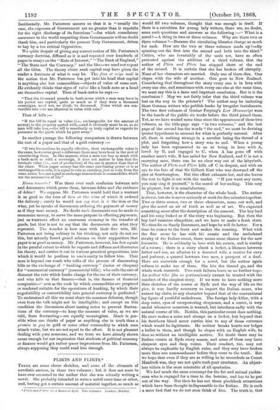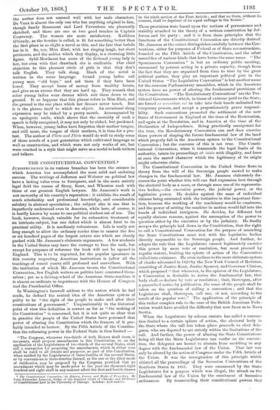FLIRTS AND FLIRTS.*
THERE are some clever sketches, and some of the elements of novelistic success, in these two volumes ; but it does not seem to have ever occurred to the author that she was actually writing a novel. She probably intended to write a novel some time or other, and, having got a certain amount of material together, so much as
* Flirts andFlirts: or, a Season at Ryde. Two volumes. London: Bentley.
would fill two volumes, thought that was enough in itself. If there is a catechism for young lady writers, there are, no doubt, some such questions and answers as the following :—" What is a novel ?—A thing in two or three volumes. Why are there two or three volumes ?—Because the circulating libraries charge so much for each. How are the two or three volumes made up ?—By spinning out the first into the second and both into the third." Critics, who are invariably of the male sex, have so often protested against the addition of a third volume, that the author of Flirts and Flirts has stopped short at the end of the second. It is certain that she has broken off abruptly. None of her characters are married. Only one of them dies. One elopes with the wife of another. One goes to New Zealand. Considering that throughout the story every one is in love with every one else, and sometimes with every one else at the same time, we must say this is a lame and impotent conclusion. But is it the conclusion? May we not fairly infer that the third volume was lost on the way to the printer's? The author may be imitating those German writers who publish books by irregular instalments. The two first volumes of Gustav Freytag's Lost Manuscript were in the hands of the public six weeks before the third joined them. Yet, as we have waited some time since the appearance of these two volumes, as the title-page says "in two volumes," and the last page of the second has the words "the end," we must be devising quaint hypotheses to account for what is perfectly natural. After all, there is nothing strange in a novelist losing the thread of a plot, and forgetting how a story was to end. When a young lady has been represented to us as being in love with A, loved by B, and engaged to C, when A has gone off with another man's wife, B has sailed for New Zealand, and C is not a marrying man, there can be no clear way out of the labyrinth. The author of Flirts and Flirts kills off C in despair, and with an eye to the fate of that Sir Gilbert East who was drowned off the pier at Southampton. But this effort exhausts her, and she leaves the rest to fight it out with the reader. "If you want any more, you may sing it yourself," is the moral of her ending. This may be piquant, but it is unsatisfactory.
That, however, is the character of the whole book. The author is clever, but she is never seriously at work for five minutes together. Two or three scenes, two or three characters, come out well, and give the novel an air of truth as well as of art. We expected something more after the description of the concert. The boy lord and his song looked as if the story was beginning. But then the boy lord vanishes altogether, and we have to make a fresh start. We then fix on Sandy Beaumont, and hope he will do better. For a time he comes to the front and makes the running. What with the fine scene he has with his cousin and the underhand . rivalry of the Italian count, there seems some chance for the new favourite. He is evidently in love with his cousin, and is worthy of a return ; there is a story about a locket, a likeness between father and son, an allusion to a deserted wife, a motive for envy and jealousy, a quarrel between two men, a prospect of a duel. Here are materials enough for a novel, but the author again refuses to make use of them. She lets the thread go, and the whole work unravels. Two such failures leave us no further hope. An author who jibs so pertinaciously cannot be trusted with the conduct of the simplest story. If we were to have nothing more than sketches of the season at Ryde and the way of life on the pier, it was hardly necessary to import the Italian count, who cannot lay claim to any character beyond that of the conventional lay figure of youthful melodrama. The foreign lady-killer, with a deep voice, eyes of overpowering eloquence, and a secret, is very useful whenever sensation is wanted, but interferes sadly with the natural course of life. Besides, this particular count does nothing. He once makes a noise and stamps on a locket, but beyond that his Southern blood never carries him to any of those extremes which would be legitimate. He neither breaks hearts nor lodges a bullet in them, and though he elopes with an English wife, he does so without an intelligible motive. No doubt there may be Italian counts at Ryde every season, and some of them may have eloquent eyes and deep voices. Their conduct, too, may not always be explicable by English rules, and they may have broken more than one commandment before they come to the tenth. But we hope that even if they are as willing to.be scoundrels as Count Manfredi was, they are not quite such poor creatures. An object- less villain is the most miserable of all spectacles.
We feel much the same contempt for the fat and animal yachts- man who is engaged for a time to the heroine, and has to be put out of the way. But then he has not those pinchbeck attractions which have been thought indispensable to the Italian. He is such a mere fool that we do not even think of him. The truth is, that the author does not succeed well with her male characters. De Veux is almost the only one who has anything original in him, though Sandy Beaumont and Lord Faversham are pleasantly sketched, and there are one or two good touches in Captain Courteney. The women are more satisfactory. Kathleen O'Grady, as the heroine is called, is fit for something better than the first place in so slight a novel as this, and the fate that befalls her in it. So, too, Miss Zieri, with her ringing laugh, her short petticoats, and the ankles which they display, is a charming little figure. Sybil Mordaunt has more of the fictional young lady in her, but even with that drawback she is creditable. Our chief objection to this pleasant circle of girls is that they don't talk English. They talk slang. Much of the novel is -written in the same language. Grand young ladies call young men "old boys," and ask them if they have been bored. They accept loans of money from wealthy lovers, and give as an excuse that they are hard up. They remark that other young ladies wear dresses which suit them down to the ground. It so happens that this phrase refers to Miss Zieri, and the ground is the one place which her dresses never touch. But it is the phrase itself to which we object. An occasional slang expression may be risked by a pretty mouth. Accompanied by an apologetic smile, which shows that the enormity of such a speech is fully recognized, it may not only be risked, but pardoned. When, however, young ladies have forgotten their mother tongue, and still more, the tongue of their mothers, it is time for a pro- test. The author of Flirts and Flirts would do well to study some of those novels of a past generation which cultivated language as well as construction, and which were not only works of art, but were couched in a style that might serve as a model to both writers and talkers.



































 Previous page
Previous page